European real estate investors are rethinking their office property strategies in the wake of the coronavirus pandemic. While the old mantra of location, location, location still holds true, a shift towards core, core, core is apparent in the current situation.
Around half (48 per cent) of the 150 real estate companies in Germany, France and the UK surveyed by Union Investment for its investment climate study are now focusing more intensively on creditworthy, crisis-proof tenants with long-term leases. Forty-six per cent of survey participants are avoiding investment in secondary and tertiary locations.
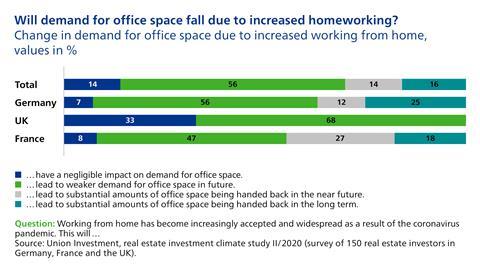
Security is now the order of the day, with 48 per cent of respondents regarding it as the most important aspect when making investment decisions. Returns are the main focus for 37 per cent, while 11 per cent cite market liquidity as a crucial factor. Only in the UK did the professional investors surveyed provide a different response: here, return on investment is the top priority for 70 per cent. Security is the primary concern for only 28 per cent of British survey participants. “This is mainly due to the special nature of British leases with their ‘upward only’ clauses as well as the still significantly longer lease terms on average, which always offer additional yield potential in addition to security,” said Olaf Janßen, head of real estate research at Union Investment.
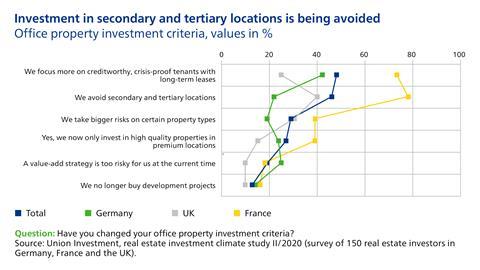
Homeworking and demand for office space
The number of people working from home has increased significantly during the coronavirus pandemic. This is causing uncertainty among the real estate investors surveyed regarding future demand for space in the office property market. More than half of the survey participants (56 per cent) expect demand for office space to weaken in future due to the increase in homeworking.
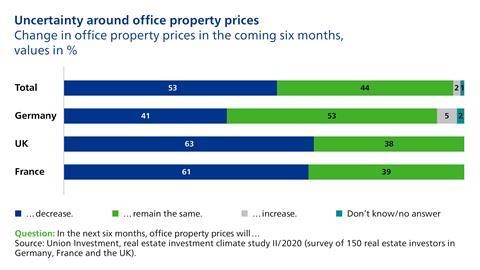
Having said that, there are no signs of a collapse in demand for office space, particularly not in core locations. “We may well see some space being handed back to landlords, but that will be spread out over the next few years thanks to the existing leases in place, and the impact is likely to be offset by the rising number of office employees,” commented Olaf Janßen. Working from home has established itself as part of a new work culture, but this does not necessarily mean traditional office space will become a thing of the past. Janßen continued: “Quite the opposite, in fact. Video conferencing is no real substitute for in-person meetings with colleagues and social interaction in the office.”
The “new core”
Secured long-term access to attractive office space will be a vital part of a hybrid workplace ecosystem for companies going forward. In the post-coronavirus world, core properties will serve as anchor space for brand identity, for attracting talent and for functions that need to be carried out in person. “These anchor spaces will be supplemented by flexible, mobile and increasingly digital-based workplace models in a way that will only begin to take shape in the coming years, depending on the individual industry,” said Janßen.
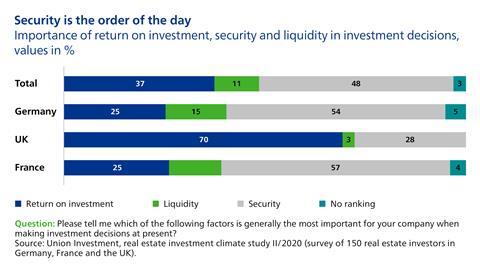
Prices remain stable
Accordingly, 44 per cent of the investors surveyed expect prices to remain stable in the office property markets over the next six months. However, 53 per cent anticipate a decline in prices. “This primarily applies to properties with challenges and short leases though,” said Janßen. He added: “The market for core properties remains extremely competitive. As a result, only minor fluctuations in prices are expected here. Initial returns will remain stable.”
Investment climate index: France and UK recovering
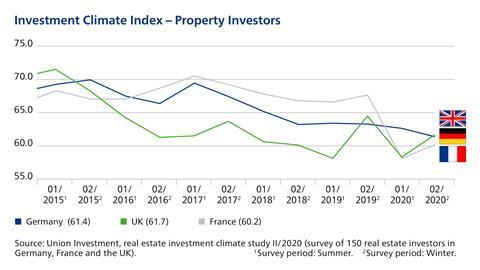
Overall, the real estate investment climate index in all three countries appears to be surprisingly uniform again after an extended period of divergence, with a difference of just 1.5 points between the lowest value (France) and the highest in the UK. In France, the sentiment index increased by 2.1 points to 60.2 points, while in the UK it rose 3.4 points to 61.7. In the last survey six months ago, the index fell by 9.5 points in France and by 6.1 points in the UK. Only in Germany, which has lost its leading position to the UK, has the index declined slightly compared to the last survey, dropping 1.2 points to 61.4 points.
Read the full press release now at the link below
Supporting documents
Click link to download and view these filesInvestor survey - Pandemic redefines office investment landscape
Word, Size 78.07 kb








